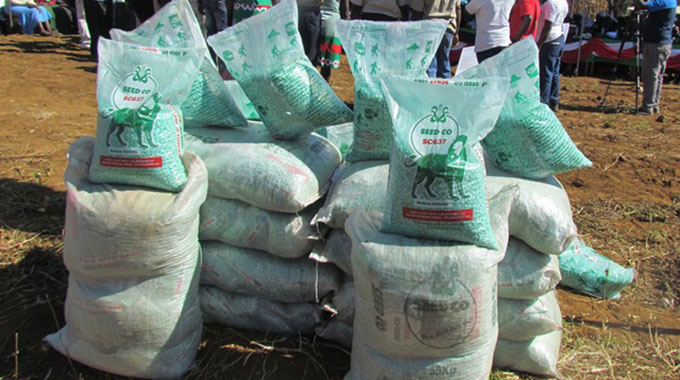Sufficient seed in place for summer season

Precious Manomano
Herald Reporter
Zimbabwe has secured enough seed to cover this year’s summer cropping season and the majority of farmers are expected to take this opportunity to start preparations, the Government has said.
Seed growers have always assured farmers of high quality seed in terms of germination, vigour and uniformity, plant health and cob size.
Farmers have been warned to adhere to weather forecasting since it is the most critical in terms of driving both the farmers and national productivity.
The latest update from Agricultural and Rural Development Advisory Services indicates that for the 2023-24 summer cropping season, the country has so far secured 53 000 tonnes of maize seed from the actual 50 000 tonnes expected to cover 2 million hectares that is targeted by the Government.
“About 5 850 tonnes of sorghum seed is currently available from 3 500 tonnes required to cover 350 000ha. From the targeted 60 000ha of soyabean, seed industry has secured 9 500 tonnes from the targeted 6 000 tonnes. From the targeted 270 000ha of cotton, 10 000 tonnes of seed are in place from the 6 750 tonnes expected,” said the ministry.
Government is targeting cereal production of 3 775 72 tonnes, with 3 060 000 tonnes of maize and 715 728 tonnes of traditional grains as they are enough to meet the human cereal consumption requirement as well as the requirement for industrial uses and livestock feeds.
This will ensure national food and nutrition security, as well as ensuring farmers grow enough for their own family sustenance with some left over for sale.
In a recent interview, Zimbabwe Seed Trade Association chairman Mr John Makoni confirmed that Zimbabwe is seed self-sufficient.
He added that the industry strives to substitute imports, but said shortages of hybrid sunflower, hybrid sorghum and groundnuts still exist.
“The seed industry grew in the 2022/23 season to meet the projections that were set by the Government as required hectares of the various crops. We have enough seed for the next season but we end up importing hybrid sunflower, sorghum and groundnuts. The rest are open-pollinated varieties which are locally available,” he said.
The report also indicates that the country has enough seed for the traditional grains and legumes for the 2023-24 season.
Seed houses are also to import seed in order to cover shortages for the different crops.
Farmers are worried about input prices, which they say are increasing costs of production and eroding viability of farming.
Zimbabwe Indigenous Women Farmers Association Trust president Mrs Depinah Nkomo said they are geared to start the new season adding that the State-assisted programmes are helping the majority of farmers to acquire inputs.
“Acquiring seed on time is very crucial in farming. Majority rely on the Presidential Input Scheme so we are appealing for the seed companies to lower down prices so that we increase hectares. Cost of production needs to be factored into final sale prices so that we earn a profit,” she said.
Government’s focus is to increase productivity thus the 2023/24 target areas for the major crops have only been increased by 10 percent since the major thrust of the ministry is to increase production per unit area, rather than drastically expand the cultivated area.
Zimbabwe Commercial Farmers Union (ZFCU) president Dr Shadreck Makombe said farmers are ready for the next season, adding that they should improve the growing of traditional grains.
“Let’s do better on traditional grains. Farmers should view farming as a business. High input costs were affecting farmers for the past years but we appeal for Government intervention to ensure that the cost remains affordable to majority of farmers,” he said.
Over the period 1980 to 2022 the country has been recording very low yields of sorghum and sunflower at an average of 0,39 tonnes and 0,40 tonnes per hectare respectively.
One of the main causes for this low productivity was the cultivation of low yielding open-pollinated varieties from farmer’s stored seed that had been losing their vigour over the years.








Comments